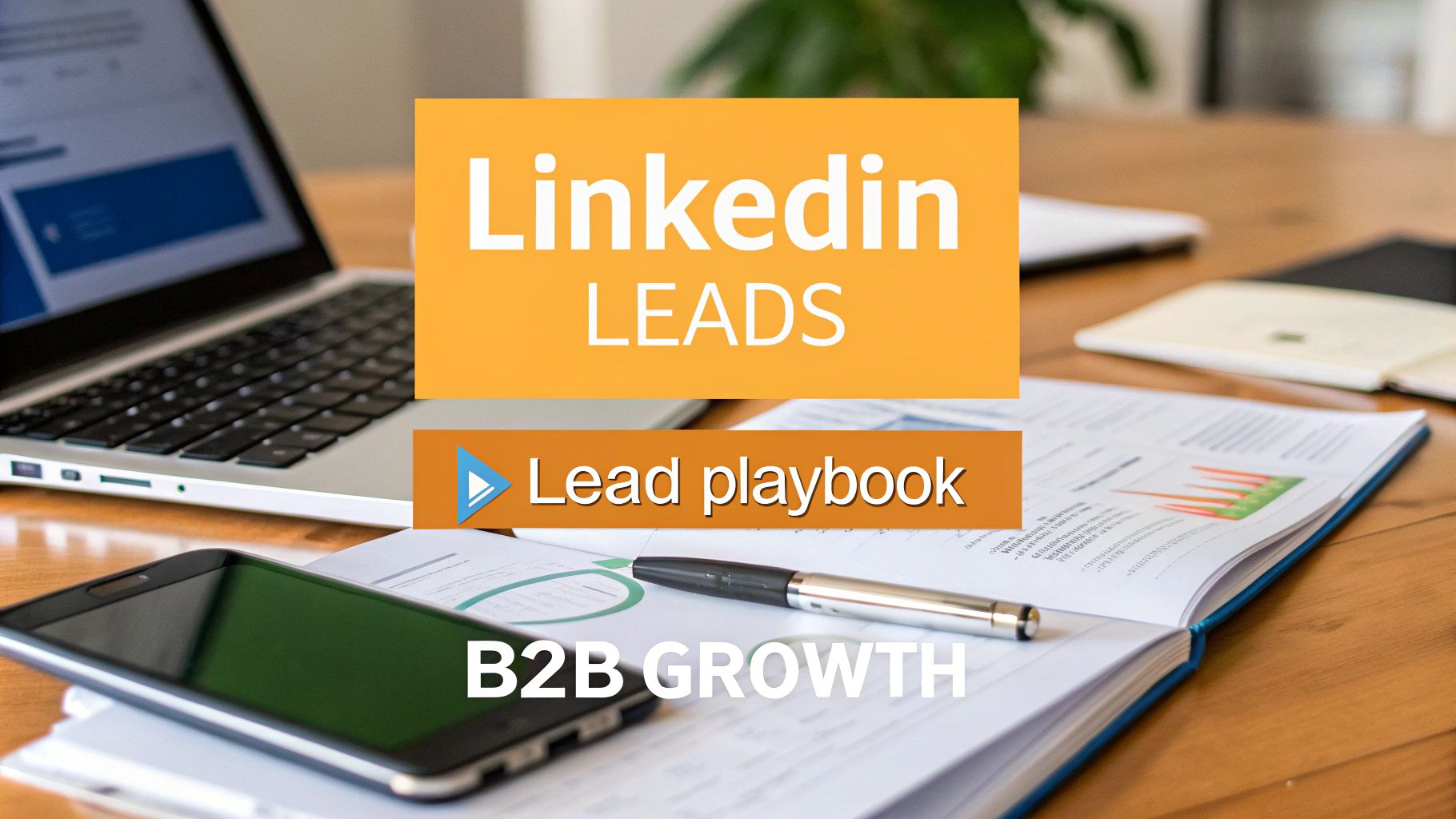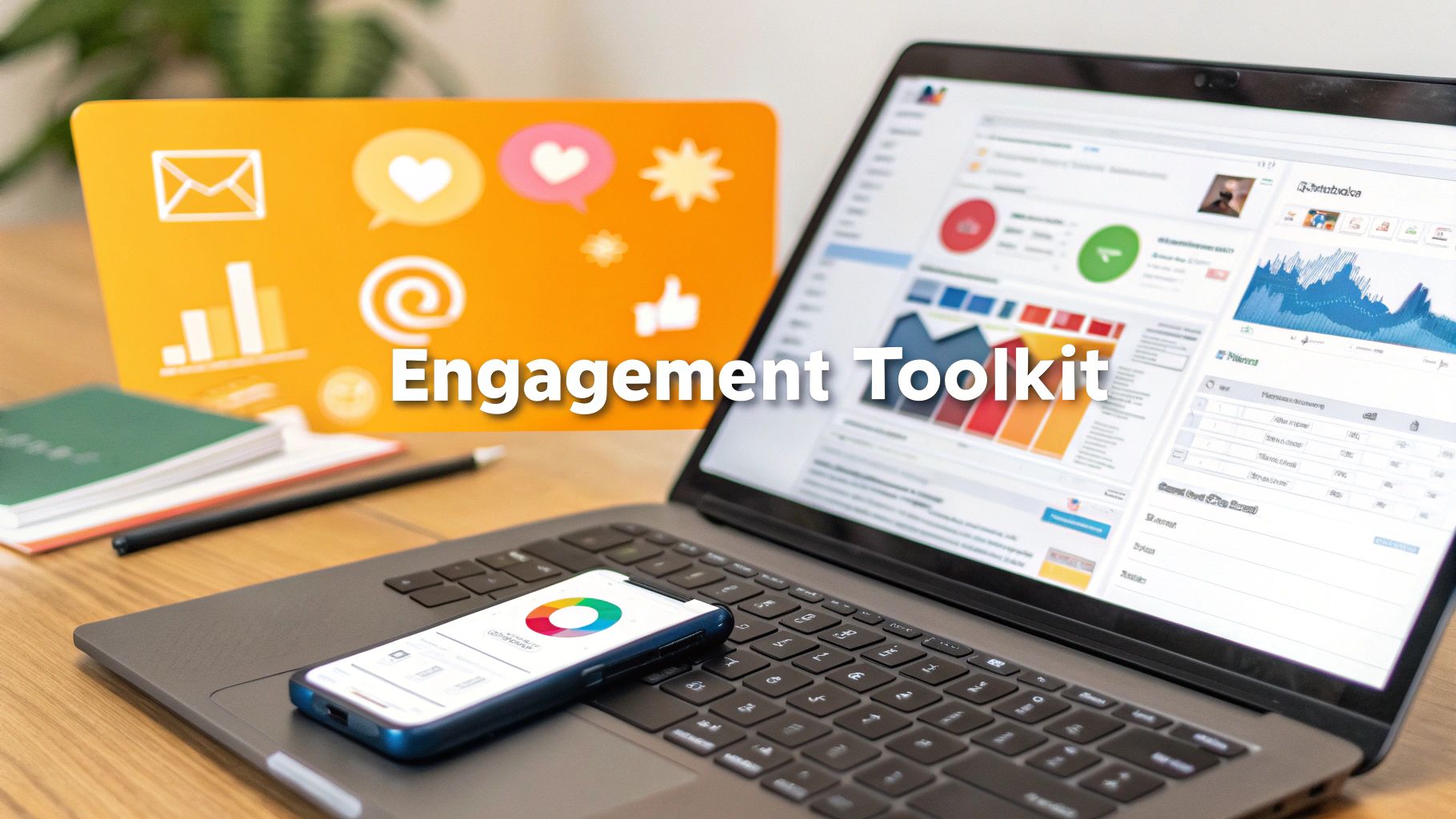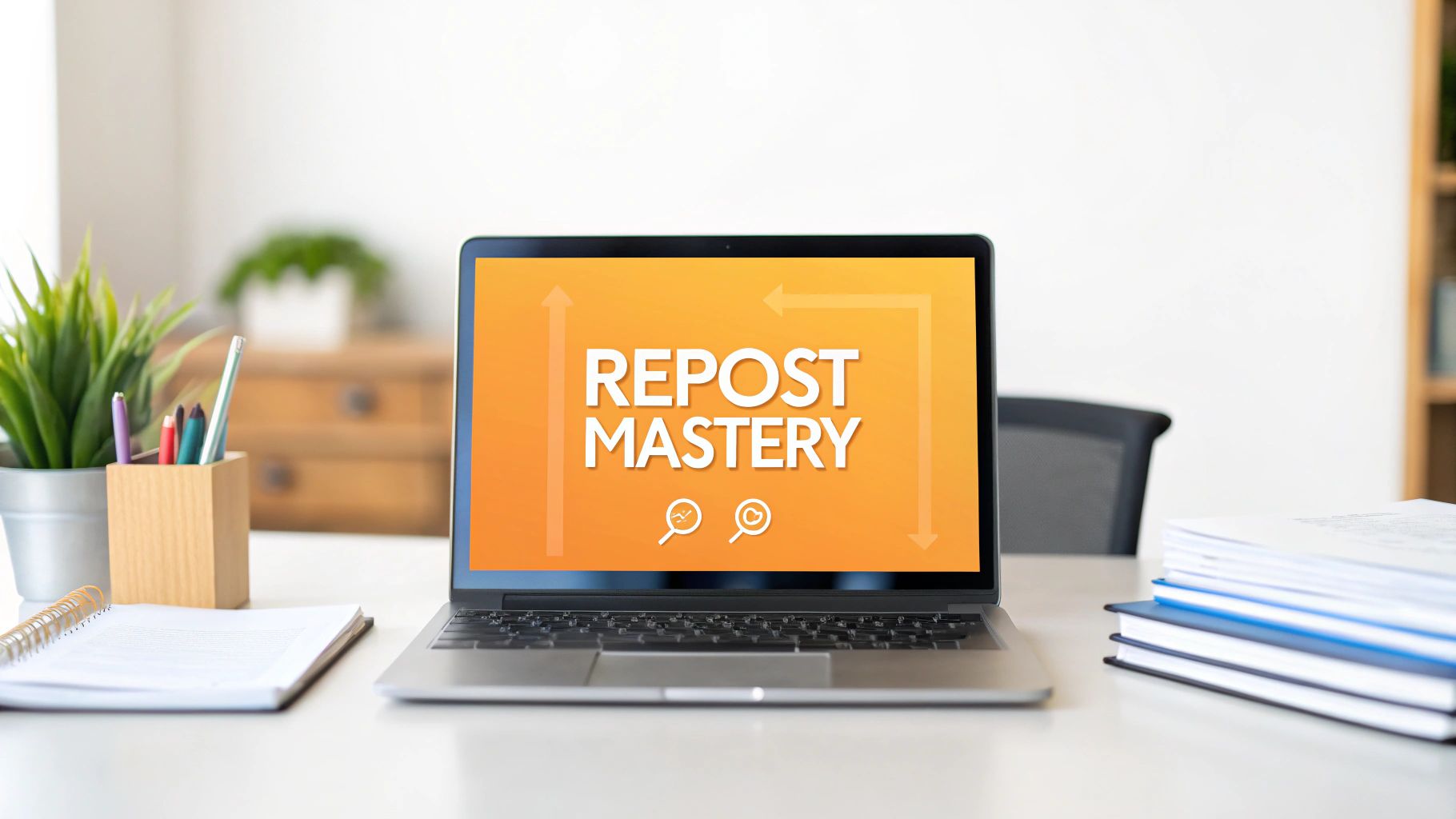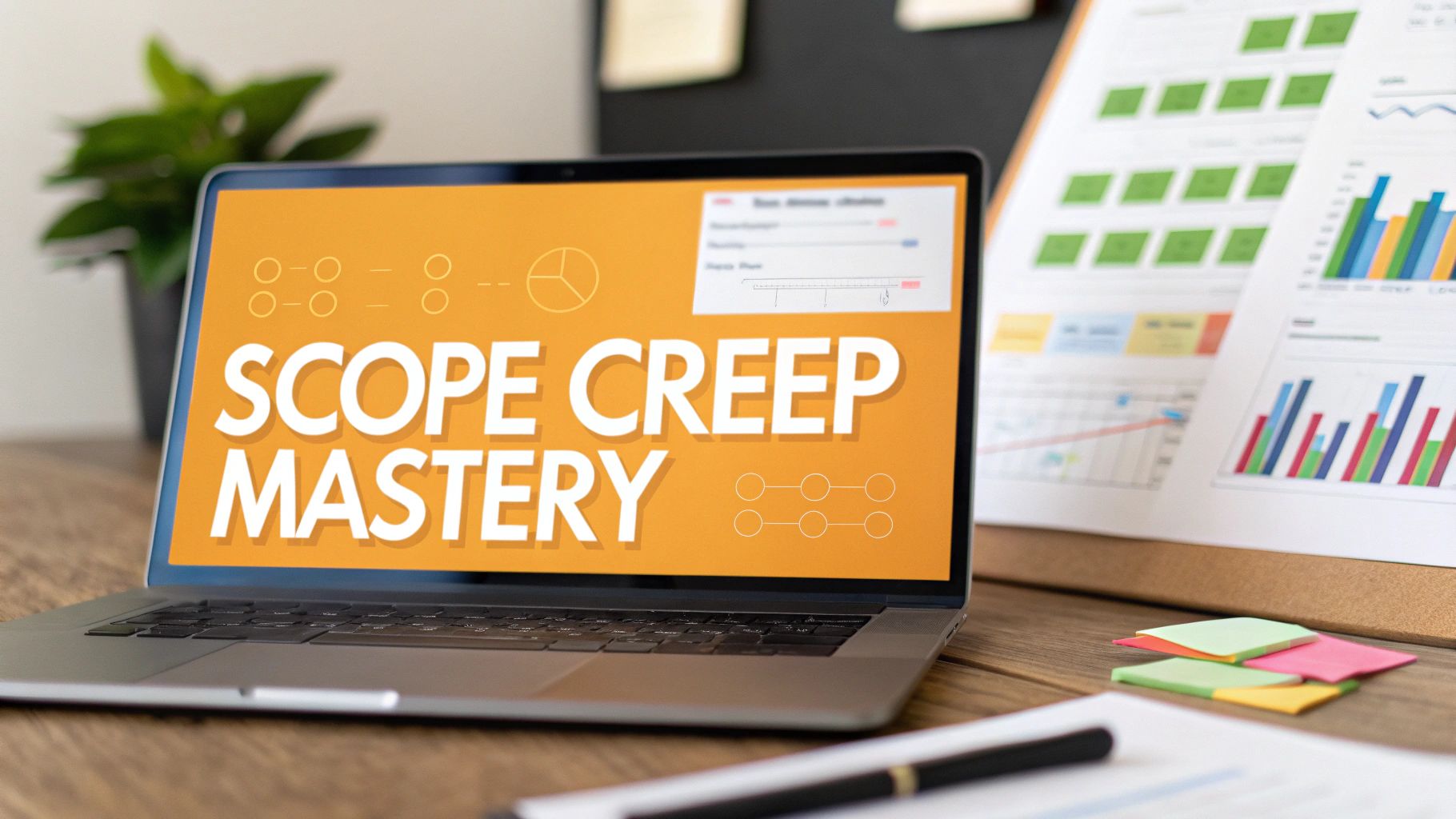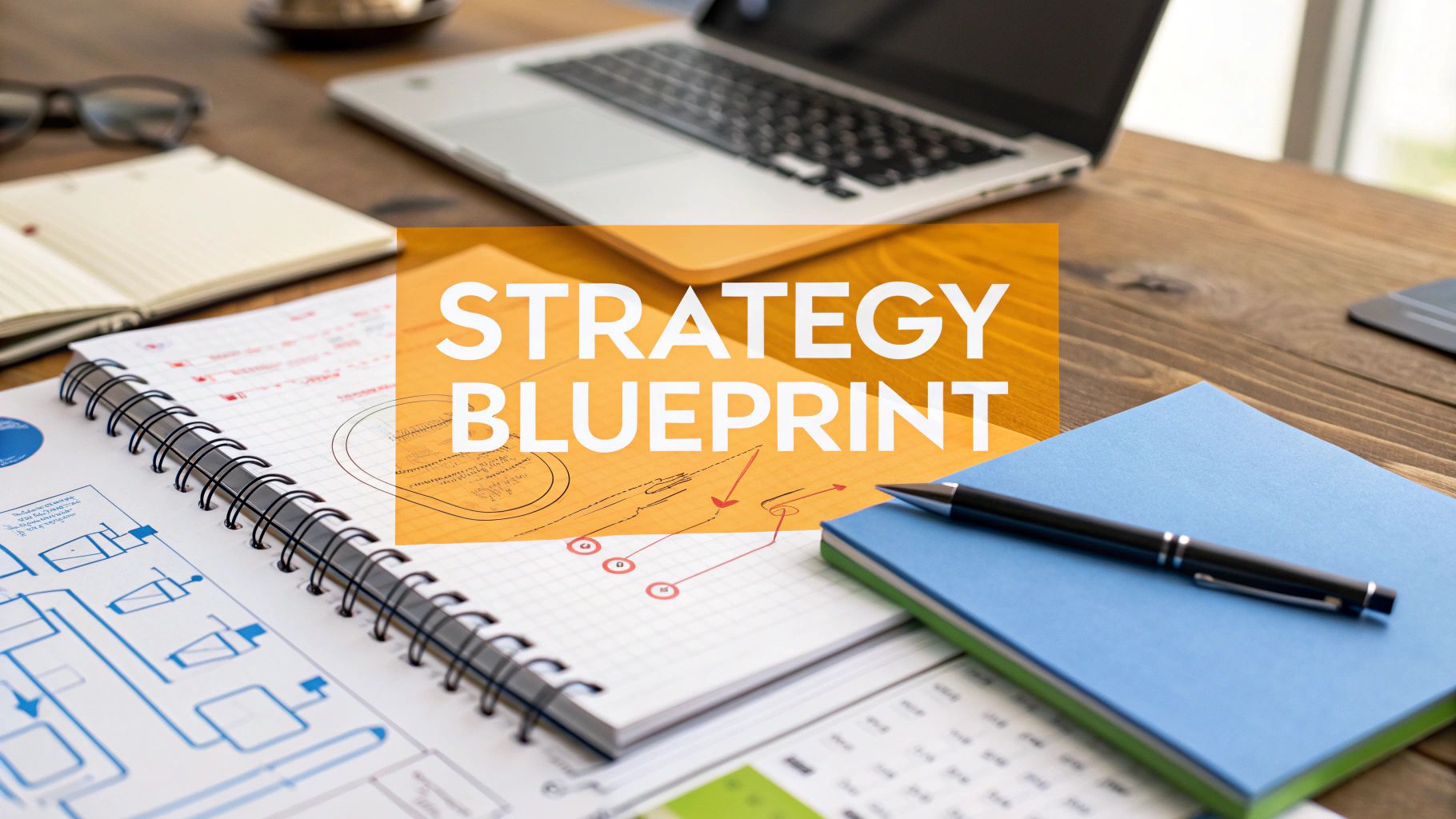So, you want to become a subject matter expert? It’s a journey that takes you from being pretty good at your job to being the person everyone turns to for the tough questions and big ideas. It's about combining deep knowledge with a commitment to always be learning.
What Being a Subject Matter Expert Really Means
Let's cut through the buzzwords. A Subject Matter Expert (SME) isn't just someone with a lofty title on their business card. They're the ones who have such a deep, hands-on understanding of a topic that they can break down complicated stuff with total clarity.
It’s not about memorizing every single fact; it's about grasping the "why" that drives the "what."
This level of expertise is a hot commodity. In the U.S., the average salary for an SME is around $119,567 a year. That number alone shows you how much companies are willing to pay for people who truly know their stuff.
An SME sees patterns and connections that others miss. They don’t just follow the playbook—they write the next chapter by questioning assumptions and finding better ways to solve problems.
The path isn't a straight line. It's a progression from building a solid foundation as a beginner, to applying that knowledge in the real world, and eventually, to shaping the future of your field.
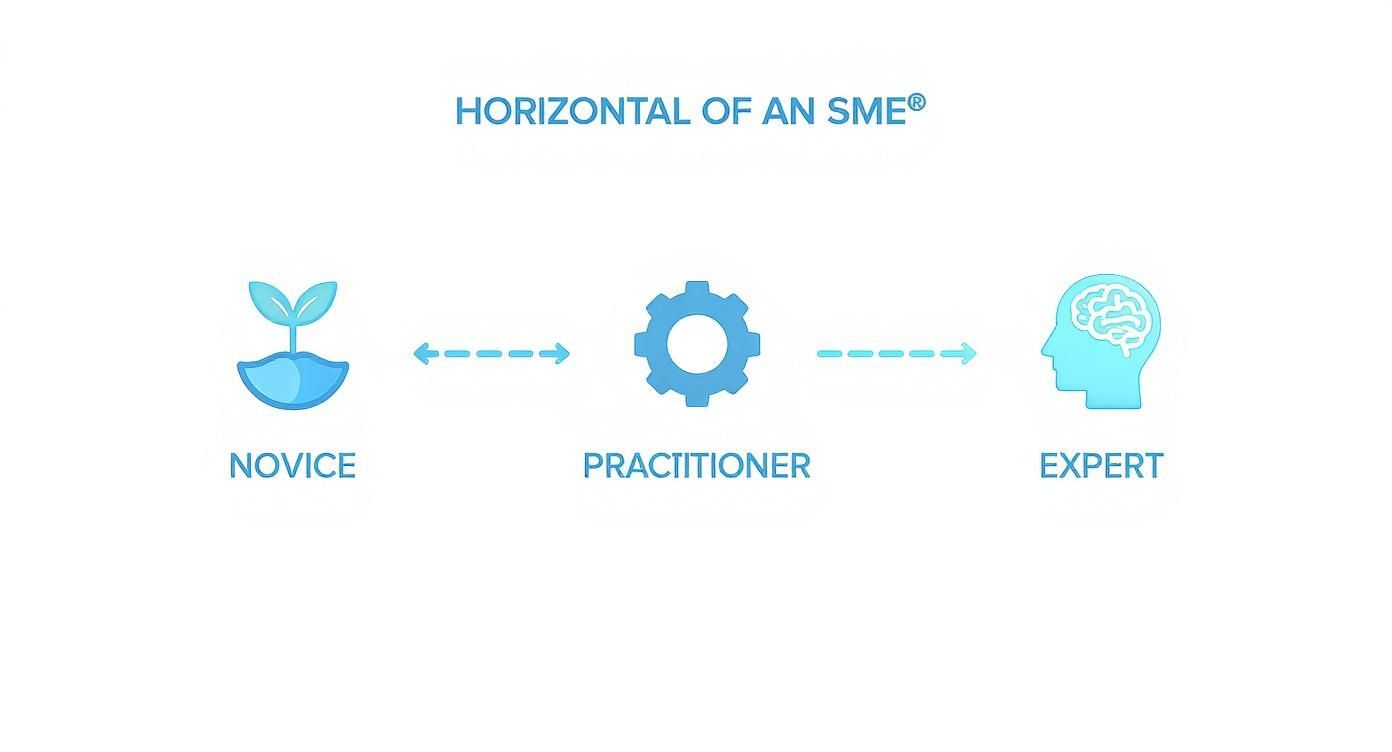
The Path from Novice to Subject Matter Expert
The journey to becoming an SME is a marathon, not a sprint. It unfolds in stages, with each level building on the last. This table breaks down what that evolution looks like.
| Stage | Primary Focus | Key Activities |
|---|---|---|
| Novice | Foundational Knowledge | Reading books, taking courses, asking basic questions, learning the core vocabulary and concepts. |
| Practitioner | Practical Application | Applying knowledge to real-world projects, solving common problems, gaining hands-on experience. |
| Specialist | Deepening Expertise | Tackling complex and unusual challenges, mentoring others, developing unique methodologies or frameworks. |
| Expert / SME | Strategic Influence | Shaping industry standards, innovating new solutions, speaking at events, creating original content. |
As you can see, expertise is earned through deliberate practice and a gradual shift in focus. It's about moving from simply doing the work to guiding the strategy behind it.
If you're looking for a great example of this path in a technical field, check out A Practical Guide to AI Product Management. The end goal is to transition from an executer to a strategic leader who drives real impact.
Digging Deep to Build Your Foundation
Want to become the go-to person in your field? It's not about skimming a few blog posts. True expertise—the kind that gets you noticed—comes from building a rock-solid foundation of knowledge. You need to go way beyond the basics and truly immerse yourself in your subject.
The aim is to stop just knowing facts and start understanding the intricate connections, the history, and where things are headed. Think of it less like casual reading and more like designing your own personal masterclass.

Design Your Personal Learning Plan
To get that well-rounded perspective, you need to pull from a variety of high-quality sources. A smart mix ensures you're not just stuck in theory-land but also seeing how these concepts play out in the real world.
Here’s what your learning toolkit should look like:
- Advanced Online Courses: Skip the 101s. Hunt down specialized courses on platforms like Coursera or edX that dive into the complex, niche corners of your domain.
- Industry Journals and Publications: This is where the newest research and groundbreaking ideas show up first. Subscribing to top journals in your field keeps you ahead of the curve.
- Foundational Academic Research: To understand today's best practices, you have to know why they exist. Go back and read the landmark studies that shaped your industry.
The real experts don't just follow trends; they understand the core principles so deeply they can see the next trend coming a mile away.
Think about how certain expert roles even came to be. As industries get more complex, the need for specialists explodes. Data science is a perfect example. As technology advanced, the demand for people with deep, practical skills in that specific area skyrocketed, leading to all sorts of specialized training. You can see this happening across the board if you explore guides on subject matter expert training on TechJobs.
When you structure your learning this way, you’re doing more than just memorizing information. You're building a mental framework that connects the dots between the past, present, and future. That's what separates a true authority from someone who just executes tasks.
Gaining Meaningful Hands-On Experience
Reading books and taking courses will give you the foundation, but true expertise is forged in the trenches. You really start to level up when you stop just learning theory and start applying it. This is where you get your hands dirty and learn to solve the messy, real-world problems that don't come with an instruction manual.
Don’t just settle for the easy stuff. You have to actively hunt for opportunities that push you beyond your comfort zone. Instead of just clocking in and doing your assigned tasks, be the person who raises their hand for the tough projects—the ones everyone else is quietly trying to avoid.

These challenges are where the real learning happens. They force you to think on your feet, get creative, and find solutions under pressure.
From Passive Participant to Active Builder
There’s a massive difference between just accumulating years on the job and strategically building experience. One approach leads to stagnation, where your growth flatlines after a few years. The other puts you on a fast track to becoming a true authority in your field.
It all boils down to this: are you just letting experience happen to you, or are you actively shaping it?
Your goal shouldn't be to just get through a project; it's to squeeze every last drop of learning out of it. Get in the habit of documenting your process, noting what worked and what spectacularly failed, and looking for patterns.
This simple habit of documenting and reflecting is a game-changer. It cements your learning and builds a personal library of insights you can draw on for years. Eventually, you can start mentoring junior colleagues, which is one of the best ways to pressure-test your own understanding. If you can't explain it simply, you don't know it well enough.
Thinking about your career in terms of active versus passive experience can make all the difference.
Passive Experience vs Active Experience Building
| Attribute | Passive Experience | Active Experience |
|---|---|---|
| Project Selection | Accepts assigned tasks without question. | Volunteers for challenging, high-impact projects. |
| Problem-Solving | Follows existing procedures and playbooks. | Questions assumptions and experiments with new solutions. |
| Learning | Waits for formal training opportunities. | Documents processes, reflects on failures, and teaches others. |
| Outcome | Becomes competent at a specific role. | Develops deep, adaptable, and transferable expertise. |
Ultimately, active experience building is all about being intentional. Every project, every challenge, becomes a deliberate step toward mastering your craft.
Once you start accumulating these real-world lessons, sharing them is the next logical step to building your reputation. A great place to start is by figuring out how to write a LinkedIn article that showcases what you've actually learned from your hands-on work.
Sharing Your Expertise to Build Authority
https://www.youtube.com/embed/B7CwU_tNYIE
Having deep knowledge is one thing, but if you’re the best-kept secret in your industry, you haven't really become a subject matter expert. The next step—the most important one, really—is to start sharing what you know. This isn’t about showing off; it's about deliberately building your reputation and proving your value.
You don’t have to launch a massive podcast overnight. The best way to start is small and within a safe environment: your own company.
Every time you teach someone, you sharpen your own understanding. Explaining a complex topic forces you to simplify and solidify your knowledge, which is a powerful step in your own development.
Offer to run a casual "lunch and learn" for your team on a new process you’ve nailed down. You could also write up a quick summary of what you learned from a tough project for an internal newsletter. These low-stakes actions build your confidence and, just as importantly, position you as the helpful, go-to person among your colleagues.
Taking Your Knowledge Public
Once you get comfortable sharing internally, it’s time to take it outside the company walls. This is where you shift from being a company resource to becoming a voice in your industry. Building that external authority takes a bit of a plan. After putting in the work to grow your knowledge, you have to learn how to market yourself and stand out professionally.
Here are a few practical ways to get the ball rolling:
- Actually Use LinkedIn: Don't just like posts. Drop insightful comments on other experts’ content that genuinely add to the conversation. Post your own takeaways from a recent project or a new industry report.
- Jump Into Niche Forums: Find online communities on places like Reddit or industry-specific forums where people are asking questions you can answer. Giving helpful, no-strings-attached responses is a surprisingly effective way to build a solid reputation.
- Speak at a Local Meetup: You'd be surprised how many industry groups are desperate for speakers. A short, 20-minute talk at a local event is a fantastic way to practice public speaking and meet people in your field.
These aren't just one-off actions; they create a public record of your expertise. For instance, consistently posting on LinkedIn showcases how your knowledge is growing and evolving over time.
If you need a little inspiration on how to frame your insights, checking out some great thought leadership content examples can really help. The goal is to create a trail of valuable content that proves you know what you're talking about.
Shape Your Field Through Collaboration
Being a true expert isn't about reaching some imaginary finish line. It's about getting to a place where you can actually influence your industry. You're no longer just playing the game; you're helping to write the rules. This is the pivot from being good at what you do to becoming someone people can't ignore.
A great way to start is by formalizing what you know. Going after advanced certifications isn't just about adding another acronym to your LinkedIn profile. It's about getting external validation for your skills and showing you're serious about your craft.

This process also puts you in a room with other driven professionals. Don't underestimate the power of these connections. If you're new to this, understanding what professional networking is can be a game-changer, opening doors you didn't even know existed.
Go From Participant to Pioneer
The real magic happens when you start giving back to your community. This is how you build a legacy and make sure your knowledge outlasts your current role.
Think about getting involved in a few high-impact activities:
- Join an Industry Working Group: These are the groups that set the standards and best practices for your field. Getting a seat at that table means your voice helps steer the ship.
- Contribute to Open-Source Projects: For my fellow tech folks, this is huge. Lending your skills to a collaborative project not only builds your reputation but proves you can work well with others.
- Help Build Certification Exams: Ever wonder who writes those tough exam questions? It's subject matter experts (SMEs). This is your chance to define what competence looks like in your field.
When you become a true subject matter expert, you're not just following the map anymore—you're helping draw it for everyone coming up behind you.
This kind of contribution is incredibly valuable. Take CompTIA, for example. They rely heavily on SMEs to create and update their foundational certs like A+, Network+, and Security+. The fact that their SME program has grown so much over the past decade just shows how essential this kind of collaboration has become.
Got Questions? Everyone Does. Let's Talk Through Them.
The path to becoming the go-to expert in your field isn't always a straight line. It’s totally normal to hit bumps, question yourself, and wonder if you're even on the right track. Let’s tackle a few of the most common questions that pop up on this journey.
So, How Long Does This Actually Take?
Look, there’s no magic number here. Becoming a true expert isn't something that happens overnight. In some fields, you might not even be considered an SME until you've put in 5+ years of serious, hands-on work. But honestly, the timeline depends entirely on how complex your niche is and how hard you're willing to work at it.
Instead of obsessing over a date on the calendar, try tracking your progress with real-world milestones. Are people starting to ask you for advice? Are you getting handed the keys to more complex projects? Those are the signs that really matter—they show your expertise is growing and, just as importantly, getting noticed.
What If I Feel Like a Total Fraud?
Ah, imposter syndrome. That little voice in your head whispering, "You're going to be found out any minute now." It’s a classic, especially for driven people who are constantly leveling up.
Feeling like you don't know everything isn't a sign that you're an imposter. It's a sign that you're smart enough to realize how much there is to learn.
Here’s a practical tip that works: start a "brag file." Seriously. It can be a simple document or a folder where you save screenshots of positive feedback, notes on tough problems you solved, and any praise you receive. When that self-doubt starts creeping in, pull it out. It's hard to argue with cold, hard proof of your own competence.
My Job Isn’t Helping Me Grow. What Now?
This is a tough one, and it’s a situation a lot of people find themselves in. If your day job feels like a dead end with no new challenges or chances to learn, you've got a couple of moves.
First, try to carve out your own opportunities. See a problem no one's tackling? Pitch a small project to solve it. Start an informal lunch-and-learn to share what you know. Sometimes, a little bit of initiative is all it takes to show your boss you're ready for more.
If that goes nowhere, it's time to look outside your company walls. Join an industry group, volunteer your skills for a non-profit, or start building your personal brand by writing about your work online. If your current environment won't water your ambitions, you might just have to find new soil to grow in.
Ready to build your authority and share your expertise with the world? RedactAI makes it easy to craft compelling LinkedIn posts that showcase your knowledge in your authentic voice. Stop staring at a blank screen and start creating content that gets you noticed. Join over 21,000 creators and start for free at RedactAI.






















